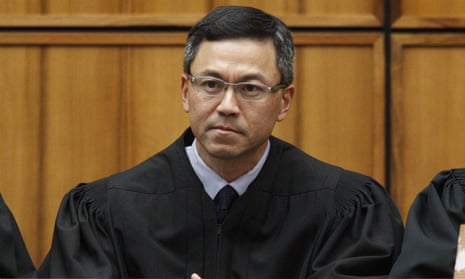Derrick Watson, a district judge in Honolulu, has blocked Donald Trump’s revised travel ban just hours before it was scheduled to go into effect, marking another stinging blow to the administration.
You can read the full ruling to issue a nationwide temporary restraining order (TRO) against the ban from the federal district court in Hawaii here.
Below are highlights from his sometimes scathing ruling.
On the White House’s motives:
The Government appropriately cautions that, in determining purpose, courts should not look into the ‘veiled psyche’ and ‘secret motives’ of government decision-makers and may not undertake a ‘judicial psychoanalysis of a drafter’s heart of hearts’.
The Government need not fear. The remarkable facts at issue here require no such impermissible inquiry.
For instance, there is nothing ‘veiled’ about this press release: ‘Donald J. Trump is calling for a total and complete shutdown of Muslims entering the United States.’
Nor is there anything ‘secret’ about the Executive’s motive specific to the issuance of the Executive Order:
Rudolph Giuliani explained on television how the Executive Order came to be. He said: “When [Mr. Trump] first announced it, he said, ‘Muslim ban.’ He called me up. He said, ‘Put a commission together. Show me the right way to do it legally.’”
The judge’s ruling cites several comments made by Trump – put forward by the state of Hawaii as evidence that the travel ban is, despite government denials, a Muslim ban:
In an interview on January 25, 2017, Mr. Trump discussed his plans to implement ‘extreme vetting’ of people seeking entry into the United States. He remarked: ‘[N]o, it’s not the Muslim ban. But it’s countries that have tremendous terror ... [I]t’s countries that people are going to come in and cause us tremendous problems.’ …
When signing the first Executive Order [No. 13,769], President Trump read the title, looked up, and said: ‘We all know what that means.’ President Trump said he was ‘establishing a new vetting measure to keep radical Islamic terrorists out of the United States of America’, and that: ‘We don’t want them here.’
Comments made by Trump adviser Rudy Giuliani have also come back into play. The court ruling includes this admission, cited by the plaintiffs as proof the ban is intended to target Muslims:
The day after signing the first Executive Order [No. 13,769], President Trump’s advisor, Rudolph Giuliani, explained on television how the Executive Order came to be. He said: “When [Mr. Trump] first announced it, he said, ‘Muslim ban.’ He called me up. He said, ‘Put a commission together. Show me the right way to do it legally.’”
The ruling also cites comments made by Stephen Miller, a senior adviser to Trump, that the second order was a “watered-down” version of the first:
On February 21, Senior Advisor to the President, Stephen Miller, told Fox News that the new travel ban would have the same effect as the old one. He said: ‘Fundamentally, you’re still going to have the same basic policy outcome for the country, but you’re going to be responsive to a lot of very technical issues that were brought up by the court and those will be addressed. But in terms of protecting the country, those basic policies are still going to be in effect.’
The ruling goes on, citing the Miller comments and others made by Trump and Rudy Giuliani:
These plainly-worded statements, made in the months leading up to and contemporaneous with the signing of the Executive Order, and, in many cases, made by the Executive himself, betray the Executive Order’s stated secular purpose.
Any reasonable, objective observer would conclude, as does the Court for purposes of the instant Motion for TRO, that the stated secular purpose of the Executive Order is, at the very least, ‘secondary to a religious objective’ of temporarily suspending the entry of Muslims.
Referring to Dr Elshikh – a Hawaiian resident and a Muslim, named along with the state as a plaintiff because of the alleged effects of the travel ban on himself and his family – the judge said:
Because a reasonable, objective observer – enlightened by the specific historical context, contemporaneous public statements, and specific sequence of events leading to its issuance – would conclude that the Executive Order was issued with a purpose to disfavor a particular religion, in spite of its stated, religiously-neutral purpose, the Court finds that Plaintiffs, and Dr Elshikh in particular, are likely to succeed on the merits of their Establishment Clause claim.
A stinging rebuke, among many, to the government:
The illogic of the Government’s contentions is palpable. The notion that one can demonstrate animus toward any group of people only by targeting all of them at once is fundamentally flawed.
Watson also casts doubt on government claims that the ban on travelers from six Muslim-majority countries was necessary for national security reasons:
When considered alongside the constitutional injuries and harms discussed above, and the questionable evidence supporting the Government’s national security motivations, the balance of equities and public interests justify granting the Plaintiffs’ TRO [temporary restraining order].
Watson concludes in his ruling that the revised ban is in fact not all that different to the original one:
Based upon the current record available, however, the Court cannot find the actions taken during the interval between revoked Executive Order No. 13,769 and the new Executive Order to be ‘genuine changes in constitutionally significant conditions’.










